1-ethynyl-4-isopropylbenzene

1-ethynyl-4-isopropylbenzene structure
|
Common Name | 1-ethynyl-4-isopropylbenzene | ||
|---|---|---|---|---|
| CAS Number | 132464-91-6 | Molecular Weight | 144.21300 | |
| Density | N/A | Boiling Point | N/A | |
| Molecular Formula | C11H12 | Melting Point | N/A | |
| MSDS | N/A | Flash Point | N/A | |
| Name | 1-ethynyl-4-isopropylbenzene |
|---|---|
| Synonym | More Synonyms |
| Molecular Formula | C11H12 |
|---|---|
| Molecular Weight | 144.21300 |
| Exact Mass | 144.09400 |
| LogP | 2.79130 |
|
SECTION 1: Identification of the substance/mixture and of the company/undertaking Product identifiers Product name: (4-(2-Methylpropyl)Phenyl)Acetylene REACH No.: A registration number is not available for this substance as the substance or its uses are exempted from registration, the annual tonnage does not require a registration or the registration is envisaged for a later registration deadline.
CAS-No.: 132464-91-6 Relevant identified uses of the substance or mixture and uses advised against Identified uses: Laboratory chemicals, Manufacture of substances SECTION 2: Hazards identification Classification of the substance or mixture Not a hazardous substance or mixture according to Regulation (EC) No. 1272/2008. Classification according to EU Directives 67/548/EEC or 1999/45/EC N Dangerous for theR51/53 environment For the full text of the R-phrases mentioned in this Section, see Section 16. Label elements Other hazards This substance/mixture contains no components considered to be either persistent, bioaccumulative and toxic (PBT), or very persistent and very bioaccumulative (vPvB) at levels of 0.1% or higher. SECTION 3: Composition/information on ingredients Substances Molecular weight: 158,24 g/mol CAS-No.: 132464-91-6 Hazardous ingredients according to Regulation (EC) No 1272/2008 ComponentClassificationConcentration (4-(2-Methylpropyl)phenyl)acetylene CAS-No.132464-91-6<= 100 % Hazardous ingredients according to Directive 1999/45/EC ComponentClassificationConcentration (4-(2-Methylpropyl)phenyl)acetylene CAS-No.132464-91-6N, R51/53<= 100 % SECTION 4: First aid measures Description of first aid measures General advice Consult a physician. Show this safety data sheet to the doctor in attendance. If inhaled If breathed in, move person into fresh air. If not breathing, give artificial respiration. Consult a physician. In case of skin contact Wash off with soap and plenty of water. Consult a physician. In case of eye contact Flush eyes with water as a precaution. If swallowed Never give anything by mouth to an unconscious person. Rinse mouth with water. Consult a physician. Most important symptoms and effects, both acute and delayed The most important known symptoms and effects are described in the labelling (see section 2.2) and/or in section 11 Indication of any immediate medical attention and special treatment needed No data available SECTION 5: Firefighting measures Extinguishing media Suitable extinguishing media Use water spray, alcohol-resistant foam, dry chemical or carbon dioxide. Special hazards arising from the substance or mixture Nature of decomposition products not known. Advice for firefighters Wear self-contained breathing apparatus for firefighting if necessary. Further information No data available SECTION 6: Accidental release measures Personal precautions, protective equipment and emergency procedures Use personal protective equipment. Avoid breathing vapours, mist or gas. For personal protection see section 8. Environmental precautions Do not let product enter drains. Methods and materials for containment and cleaning up Soak up with inert absorbent material and dispose of as hazardous waste. Keep in suitable, closed containers for disposal. Reference to other sections For disposal see section 13. SECTION 7: Handling and storage Precautions for safe handling For precautions see section 2.2. Conditions for safe storage, including any incompatibilities Store in cool place. Keep container tightly closed in a dry and well-ventilated place. Storage class (TRGS 510): Non Combustible Liquids Specific end use(s) Apart from the uses mentioned in section 1.2 no other specific uses are stipulated SECTION 8: Exposure controls/personal protection Control parameters Components with workplace control parameters Exposure controls Appropriate engineering controls Handle in accordance with good industrial hygiene and safety practice. Wash hands before breaks and at the end of workday. Personal protective equipment Eye/face protection Use equipment for eye protection tested and approved under appropriate government standards such as NIOSH (US) or EN 166(EU). Skin protection Handle with gloves. Gloves must be inspected prior to use. Use proper glove removal technique (without touching glove's outer surface) to avoid skin contact with this product. Dispose of contaminated gloves after use in accordance with applicable laws and good laboratory practices. Wash and dry hands. The selected protective gloves have to satisfy the specifications of EU Directive 89/686/EEC and the standard EN 374 derived from it. Body Protection impervious clothing, The type of protective equipment must be selected according to the concentration and amount of the dangerous substance at the specific workplace. Respiratory protection Where risk assessment shows air-purifying respirators are appropriate use a full-face respirator with multi-purpose combination (US) or type ABEK (EN 14387) respirator cartridges as a backup to engineering controls. If the respirator is the sole means of protection, use a full-face supplied air respirator. Use respirators and components tested and approved under appropriate government standards such as NIOSH (US) or CEN (EU). Control of environmental exposure Do not let product enter drains. SECTION 9: Physical and chemical properties Information on basic physical and chemical properties a) AppearanceForm: liquid b) OdourNo data available c) Odour ThresholdNo data available d) pHNo data available e) Melting point/freezing No data available point f) Initial boiling point and No data available boiling range g) Flash pointNot applicable h) Evaporation rateNo data available i) Flammability (solid, gas) No data available j) Upper/lowerNo data available flammability or explosive limits k) Vapour pressureNo data available l) Vapour densityNo data available m) Relative densityNo data available n) Water solubilityNo data available o) Partition coefficient: n- log Pow: 4,342 octanol/water p) Auto-ignitionNo data available temperature q) DecompositionNo data available temperature r) ViscosityNo data available s) Explosive propertiesNo data available t) Oxidizing propertiesNo data available Other safety information No data available SECTION 10: Stability and reactivity Reactivity No data available Chemical stability Stable under recommended storage conditions. Possibility of hazardous reactions No data available Conditions to avoid No data available Incompatible materials Strong oxidizing agents Hazardous decomposition products In the event of fire: see section 5 SECTION 11: Toxicological information Information on toxicological effects Acute toxicity Skin corrosion/irritation Serious eye damage/eye irritation Respiratory or skin sensitisation Germ cell mutagenicity Carcinogenicity IARC:No component of this product present at levels greater than or equal to 0.1% is identified as probable, possible or confirmed human carcinogen by IARC. Reproductive toxicity Specific target organ toxicity - single exposure Specific target organ toxicity - repeated exposure Aspiration hazard Additional Information RTECS: Not available To the best of our knowledge, the chemical, physical, and toxicological properties have not been thoroughly investigated. SECTION 12: Ecological information Toxicity Toxicity to fishLC50 - Pimephales promelas (fathead minnow) - 1,1 mg/l - 96 h Persistence and degradability Bioaccumulative potential Mobility in soil Results of PBT and vPvB assessment This substance/mixture contains no components considered to be either persistent, bioaccumulative and toxic (PBT), or very persistent and very bioaccumulative (vPvB) at levels of 0.1% or higher. Other adverse effects SECTION 13: Disposal considerations Waste treatment methods Product Offer surplus and non-recyclable solutions to a licensed disposal company. Contaminated packaging Dispose of as unused product. SECTION 14: Transport information UN number ADR/RID: -IMDG: -IATA: - UN proper shipping name ADR/RID: Not dangerous goods IMDG: Not dangerous goods IATA:Not dangerous goods Transport hazard class(es) ADR/RID: -IMDG: -IATA: - Packaging group ADR/RID: -IMDG: -IATA: - Environmental hazards ADR/RID: noIMDG Marine pollutant: noIATA: no Special precautions for user No data available SECTION 15: Regulatory information This safety datasheet complies with the requirements of Regulation (EC) No. 1907/2006. Safety, health and environmental regulations/legislation specific for the substance or mixture No data available Chemical Safety Assessment For this product a chemical safety assessment was not carried out SECTION 16: Other information Full text of R-phrases referred to under sections 2 and 3 NDangerous for the environment R51/53Toxic to aquatic organisms, may cause long-term adverse effects in the aquatic environment. Further information Copyright 2014 Co. LLC. License granted to make unlimited paper copies for internal use only. The above information is believed to be correct but does not purport to be all inclusive and shall be used only as a guide. The information in this document is based on the present state of our knowledge and is applicable to the product with regard to appropriate safety precautions. It does not represent any guarantee of the properties of the product. Corporation and its Affiliates shall not be held liable for any damage resulting from handling or from contact with the above product. See and/or the reverse side of invoice or packing slip for additional terms and conditions of sale. |
|
~% 
1-ethynyl-4-iso... CAS#:132464-91-6 |
| Literature: JAPAN TOBACCO INC. Patent: US2012/322837 A1, 2012 ; Location in patent: Page/Page column 108 ; US 20120322837 A1 |
|
~% 
1-ethynyl-4-iso... CAS#:132464-91-6 |
| Literature: Kotha; Tafesh; Davenport; Ortiz Indian Journal of Chemistry - Section B Organic and Medicinal Chemistry, 2001 , vol. 40, # 12 p. 1166 - 1169 |
|
~% 
1-ethynyl-4-iso... CAS#:132464-91-6 |
| Literature: JAPAN TOBACCO INC. Patent: US2012/322837 A1, 2012 ; US 20120322837 A1 |
|
~% 
1-ethynyl-4-iso... CAS#:132464-91-6 |
| Literature: JAPAN TOBACCO INC. Patent: US2012/322837 A1, 2012 ; US 20120322837 A1 |
|
~% 
1-ethynyl-4-iso... CAS#:132464-91-6 |
| Literature: JAPAN TOBACCO INC. Patent: US2012/322837 A1, 2012 ; US 20120322837 A1 |
| 1-ethynyl-4-isobutylbenzene |
| p-isobutylphenylacetonitrile |
| 4'-isobutylphenyl acetylene |
| 4-isobutylphenylacetonitrile |
| p-Isobutylphenylacetonitril |

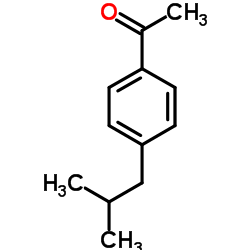
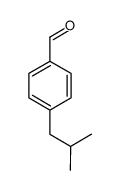
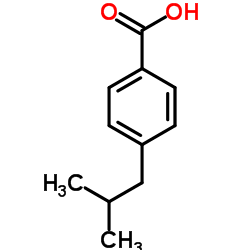

 CAS#:15687-27-1
CAS#:15687-27-1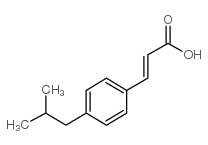 CAS#:66734-95-0
CAS#:66734-95-0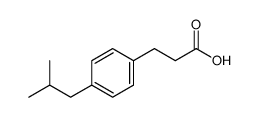 CAS#:65322-85-2
CAS#:65322-85-2 CAS#:918110-09-5
CAS#:918110-09-5